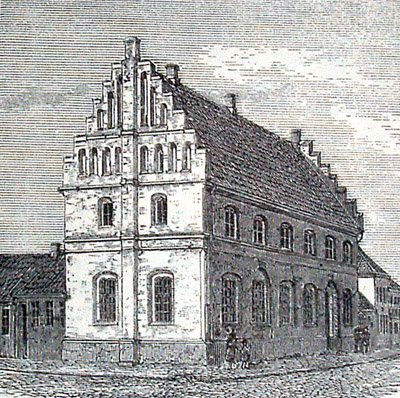|
Jens Rasmussen (human Factors Expert)
Jens Rasmussen (11 May 1926 – 5 February 2018) was a system safety, human factors and cognitive systems engineering researcher at the Risø National Laboratory in Risø, Denmark. He was highly influential within the field of safety science, human error and accident research. His contributions include the skills, rules, knowledge (SRK) framework, risk management framework, dynamic safety model, AcciMap Approach, and others. Biography Rasmussen was born in Ribe, Denmark. In 1950, he earned an M.Sc. degree in electronic engineering, with a background in control engineering. After completing his degree, he worked for several years at the Radio Receiver Research Laboratory. In 1956, Rasmussen was recruited to work at the Danish Atomic Energy Commission. After several years, he was named the head of the Electronics Department at the Atomic Research Establishment Risø (eventually renamed Risø National Laboratory). In 1981, Rasmussen was appointed Research Professor at both t ... [...More Info...] [...Related Items...] OR: [Wikipedia] [Google] [Baidu] |
System Safety
The system safety concept calls for a risk management strategy based on identification, analysis of hazards and application of remedial controls using a systems-based approach. This is different from traditional safety strategies which rely on control of conditions and causes of an accident based either on the epidemiological analysis or as a result of investigation of individual past accidents. The concept of system safety is useful in demonstrating adequacy of technologies when difficulties are faced with probabilistic risk analysis. The underlying principle is one of synergy: a whole is more than sum of its parts. Systems-based approach to safety requires the application of scientific, technical and managerial skills to hazard identification, hazard analysis, and elimination, control, or management of hazards throughout the life-cycle of a system, program, project or an activity or a product. "Hazop" is one of several techniques available for identification of hazards. System ... [...More Info...] [...Related Items...] OR: [Wikipedia] [Google] [Baidu] |
Technical University Of Denmark
The Technical University of Denmark (), often simply referred to as DTU, is a polytechnic university and school of engineering. It was founded in 1829 at the initiative of Hans Christian Ørsted as Denmark's first polytechnic, and it is today ranked among Europe's leading engineering institutions. It is located in the town Kongens Lyngby, north of central Copenhagen, Denmark. Along with École Polytechnique in Paris, École Polytechnique Fédérale de Lausanne, Eindhoven University of Technology, Technical University of Munich and Technion – Israel Institute of Technology, DTU is a member of EuroTech Universities Alliance. History DTU was founded in 1829 as the "College of Advanced Technology" (Danish: Den Polytekniske Læreanstalt). The Physicist Hans Christian Ørsted, at that time a professor at the University of Copenhagen, was one of the driving forces behind this initiative. He was inspired by the École Polytechnique in Paris, France which Ørsted had visited as a ... [...More Info...] [...Related Items...] OR: [Wikipedia] [Google] [Baidu] |
People From Ribe
The term "the people" refers to the public or common mass of people of a polity. As such it is a concept of human rights law, international law as well as constitutional law, particularly used for claims of popular sovereignty. In contrast, a people is any plurality of persons considered as a whole. Used in politics and law, the term "a people" refers to the collective or community of an ethnic group or nation. Concepts Legal Chapter One, Article One of the Charter of the United Nations states that "peoples" have the right to self-determination. Though the mere status as peoples and the right to self-determination, as for example in the case of Indigenous peoples (''peoples'', as in all groups of indigenous people, not merely all indigenous persons as in ''indigenous people''), does not automatically provide for independent sovereignty and therefore secession. Indeed, judge Ivor Jennings identified the inherent problems in the right of "peoples" to self-determination, as i ... [...More Info...] [...Related Items...] OR: [Wikipedia] [Google] [Baidu] |
Safety Researchers
Safety is the state of being protected from harm or other danger. Safety can also refer to the control of recognized hazards in order to achieve an acceptable level of risk. Meanings The word 'safety' entered the English language in the 14th century. It is derived from Latin , meaning uninjured, in good health, safe. There are two slightly different meanings of "safety". For example, "home safety" may indicate a building's ability to protect against external harm events (such as weather, home invasion, etc.), or may indicate that its internal installations (such as appliances, stairs, etc.) are safe (not dangerous or harmful) for its inhabitants. Discussions of safety often include mention of related terms. Security is such a term. With time the definitions between these two have often become interchanged, equated, and frequently appear juxtaposed in the same sentence. Readers are left to conclude whether they comprise a redundancy. This confuses the uniqueness that shoul ... [...More Info...] [...Related Items...] OR: [Wikipedia] [Google] [Baidu] |
Danish Academics
Danish may refer to: * Something of, from, or related to the country of Denmark People * A Danish person, also called a "Dane", can be a national or citizen of Denmark (see Demographics of Denmark) * Culture of Denmark * Danish people or Danes, people with a Danish ancestral or ethnic identity * A member of the Danes, a Germanic tribe * Danish (name), a male given name and surname Language * Danish language, a North Germanic language used mostly in Denmark and Northern Germany * Danish tongue or Old Norse, the parent language of all North Germanic languages Food * Danish cuisine * Danish pastry, often simply called a "Danish" See also * Dane (other) * * Gdańsk * List of Danes * Languages of Denmark The Kingdom of Denmark has only one official language, Danish, the national language of the Danish people, but there are several minority languages spoken, namely Faroese, German, and Greenlandic. A large majority (about 86%) of Danes also ... {{disambigu ... [...More Info...] [...Related Items...] OR: [Wikipedia] [Google] [Baidu] |
2018 Deaths
This is a list of lists of deaths of notable people, organized by year. New deaths articles are added to their respective month (e.g., Deaths in ) and then linked below. 2025 2024 2023 2022 2021 2020 2019 2018 2017 2016 2015 2014 2013 2012 2011 2010 2009 2008 2007 2006 2005 2004 2003 2002 2001 2000 1999 1998 1997 1996 1995 1994 1993 1992 1991 1990 1989 1988 1987 1986 Earlier years ''Deaths in years earlier than this can usually be found in the main articles of the years.'' See also * Lists of deaths by day * Deaths by year (category) {{DEFAULTSORT:deaths by year ... [...More Info...] [...Related Items...] OR: [Wikipedia] [Google] [Baidu] |
1926 Births
In Turkey, the year technically contained only 352 days. As Friday, December 18, 1926 ''(Julian Calendar)'' was followed by Saturday, January 1, 1927 '' (Gregorian Calendar)''. 13 days were dropped to make the switch. Turkey thus became the last country to officially adopt the Gregorian Calendar, which ended the 344-year calendrical switch around the world that took place in October, 1582 by virtue of the Papal Bull made by Pope Gregory XIII. Events January * January 3 – Theodoros Pangalos declares himself dictator in Greece. * January 8 **Ibn Saud is crowned ruler of the Kingdom of Hejaz. ** Crown Prince Nguyễn Phúc Vĩnh Thuy ascends the throne as Bảo Đại, the last monarch of the Nguyễn dynasty of the Kingdom of Vietnam. * January 16 – A British Broadcasting Company radio play by Ronald Knox about workers' revolution in London causes a panic among those who have not heard the preliminary announcement that it is a satire on broadcasting. * January 21 ... [...More Info...] [...Related Items...] OR: [Wikipedia] [Google] [Baidu] |
Ribe
Ribe () is a town in south-west Jutland, Denmark, with a population of 8,367 (2025). It is the seat of the Diocese of Ribe. Until 1 January 2007, Ribe was the seat of both a surrounding municipality and county. It is now part of the enlarged Esbjerg Municipality in the Region of Southern Denmark. It is the oldest town in Denmark. History The town was a center of commercial activity in the early 8th century, and this may have originated with royal influence. Coins may have been struck there in 720. Whichever king was involved in the digging of the Kanhave Canal may have been involved in the establishment of Ribe also. Trade contacts were mostly with Frisia and England. Of the over 300 sceatas found in Denmark, 216 come from in or around Ribe, most of them were of the Frisian Wodan type, and these were likely minted in Ribe in the early eighth century. The Ancient Diocese of Ribe was established in 948 with the consecration of Leofdag of Ribe as its first bishop. Early in t ... [...More Info...] [...Related Items...] OR: [Wikipedia] [Google] [Baidu] |
Human Factors
Ergonomics, also known as human factors or human factors engineering (HFE), is the application of psychological and physiological principles to the engineering and design of products, processes, and systems. Primary goals of human factors engineering are to reduce human error, increase productivity and system availability, and enhance safety, health and comfort with a specific focus on the interaction between the human and equipment. The field is a combination of numerous disciplines, such as psychology, sociology, engineering, biomechanics, industrial design, physiology, anthropometry, interaction design, visual design, user experience, and user interface design. Human factors research employs methods and approaches from these and other knowledge disciplines to study human behavior and generate data relevant to previously stated goals. In studying and sharing learning on the design of equipment, devices, and processes that fit the human body and its cognitive abilities, ... [...More Info...] [...Related Items...] OR: [Wikipedia] [Google] [Baidu] |
Ecological Interface Design
Ecological interface design (EID) is an approach to interface design that was introduced specifically for complex sociotechnical, real-time, and dynamic systems. It has been applied in a variety of domains including process control (e.g. nuclear power plants, petrochemical plants), aviation, and medicine. EID differs from some interface design methodologies like user-centered design (UCD) in that the focus of the analysis is on the work domain or environment, rather than on the end user or a specific task. The goal of EID is to make constraints and complex relationships in the work environment perceptually evident (e.g. visible, audible) to the user. This allows more of users' cognitive resources to be devoted to higher cognitive processes such as problem solving and decision making. EID is based on two key concepts from cognitive engineering and cognitive systems engineering research: the Abstraction Hierarchy (AH) and the Skills, Rules, Knowledge (SRK) framework. By reducin ... [...More Info...] [...Related Items...] OR: [Wikipedia] [Google] [Baidu] |




